Exploring the Varied Applications and Advantages of Polymers in Different Industries
Polymers, with their varied series of residential properties and functionalities, have actually become indispensable in various industries, each reaping distinct take advantage of their application. Polymers. From enhancing safety and efficiency in the vehicle market to reinventing medical gadgets in the healthcare industry, polymers play a pivotal role. Moreover, their environmentally friendly nature is altering the landscape of sustainability practices. As we dive right into the depths of polymers in electronics, we reveal sophisticated developments, while their structural integrity changes the world of construction and infrastructure. The prevalent influence of polymers across sectors is a testament to their versatility and flexibility, forming the future of countless sectors.
Automotive Sector Applications
Polymers play a pivotal role in improving the efficiency and resilience of different elements within the auto sector. One popular use of polymers in the vehicle sector is in the manufacturing of lightweight elements.

Health Care Market Benefits
In numerous health care applications, the benefits of using polymers are extensively identified for their varied series of advantageous buildings. Polymers play an important function in the health care market because of their adaptability, biocompatibility, and cost-effectiveness. Among the main benefits of polymers in health care is their capability to be tailored to particular requirements, such as flexibility, sturdiness, and biodegradability, making them perfect for a wide variety of medical applications.
Polymer-based products are thoroughly utilized in medical gadgets, such as catheters, implants, prosthetics, and medication shipment systems, due to their biocompatibility and ability to resemble all-natural tissues. These materials can reduce the risk of allergies or rejections, enhancing patient safety and security and results. Furthermore, polymers are lightweight, making them ideal for wearable clinical gadgets and guaranteeing patient comfort.
Furthermore, polymers make it possible for the development of cutting-edge treatment approaches, such as hydrogels for tissue engineering and nanocomposites for targeted medicine shipment. Their convenience of processing and sanitation makes them important for keeping high criteria of health in medical care settings. Generally, the diverse benefits of polymers add substantially to advancements in medical innovation and client care.
Ecological Advantages of Polymers

In addition, polymers can contribute to energy savings because of their lightweight nature. In industries such as transportation, lightweight polymer materials can assist minimize gas usage and greenhouse gas emissions. Furthermore, polymers can allow the growth of energy-efficient items such as insulation products that boost power preservation in structures.
Moreover, polymers play a vital duty in lowering water air pollution. The usage of polymer-based filtering systems can properly eliminate contaminants and pollutants from wastewater, safeguarding water resources and ecological communities. On the whole, the ecological advantages of polymers make them important assets in advertising sustainability and environmentally friendly practices throughout different industries.
Polymers in Electronics and Modern Technology
Taking into consideration the boosting demand for innovative and lasting services in modern sectors, the integration of sophisticated polymer technologies in the world of electronics and technology has actually arised as an essential technique for driving efficiency and efficiency. Polymers have changed the electronics sector see this website by allowing the production of lighter, extra versatile, and sturdy electronic tools. From mobile phones to clinical gadgets, polymers play a critical role in boosting item layout and capability.
One substantial advantage of polymers in electronics is their shielding homes, which help secure fragile digital components from environmental variables and electrical disturbance. Additionally, polymers are necessary in the development of adaptable displays, wearable innovation, and published electronic devices, providing countless possibilities for creating smart and interconnected gadgets.
Additionally, the use of polymers in digital product packaging has led to developments in miniaturization and thermal monitoring, enhancing the overall performance and integrity of electronic systems. As innovation remains to advance, the versatility and versatility of polymers will most certainly drive further advancement in the electronics market, forming the future of modern technology.
Duty of Polymers in Building And Construction and Infrastructure
Polymers provide various benefits in the building and construction market due to their versatility, longevity, and cost-effectiveness. One key duty of polymers in construction is their use in layers and sealers, offering protection versus environmental factors such as dampness, UV radiation, and rust.
Moreover, polymers play a crucial duty in lasting construction techniques by allowing the growth of energy-efficient structures. Insulating materials made from polymers go to the website help manage go to my site indoor temperature levels, decreasing the demand for heating and cooling down systems and eventually decreasing energy intake. The use of polymer-based composites in facilities tasks such as bridges and roads improves their durability and lowers maintenance prices. On the whole, the consolidation of polymers in building and construction and framework showcases their significant influence on modern engineering methods.
Final Thought
To conclude, polymers play a crucial role in various markets such as auto, healthcare, environmental, electronics, and construction. Their versatile buildings make them beneficial in creating ingenious options and items. From enhancing fuel effectiveness in automobiles to improving medical gadgets, polymers use countless benefits. Furthermore, their effect on minimizing waste and promoting sustainability highlights their significance in contemporary applications. The extensive use polymers shows their significant contribution to progressing modern technology and enhancing lifestyle.
Comments on “Polymers in Construction: Stronger, Lighter, and More Durable”